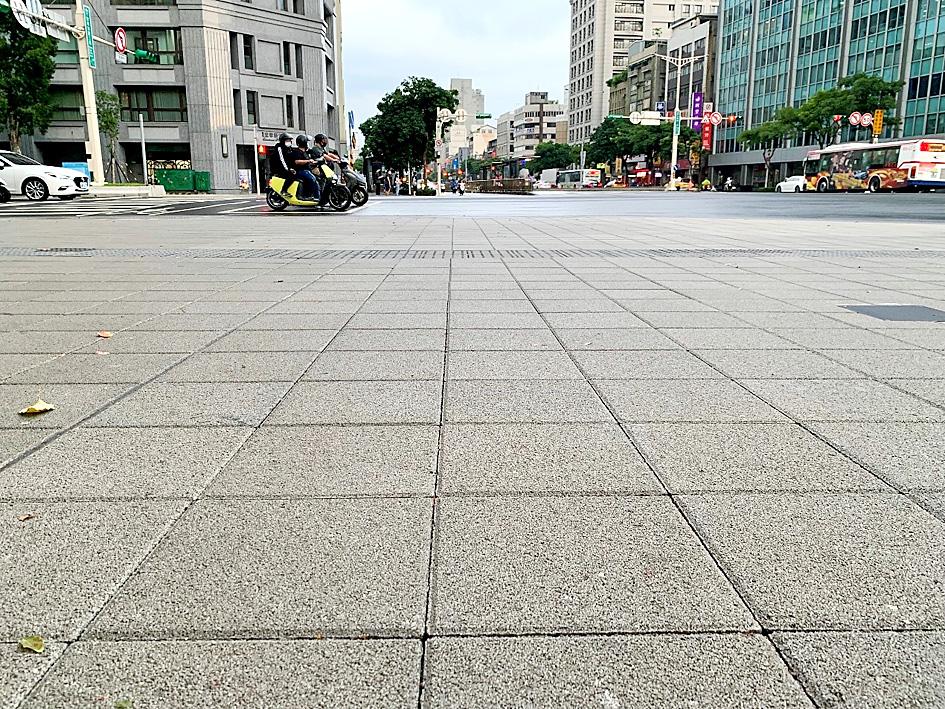Porous sidewalks installed in Taipei last year have been found to reduce surface temperatures by up to 3°C in addition to absorbing excessive runoff, researchers said on Thursday.
The Taipei City Government has been experimenting with new building materials since launching a “sponge city” initiative in 2015 to improve drainage and flood controls in the capital.
Seeking to reduce runoff along Zhongxiao E Road, which is prone to flooding, the city replaced its asphalt and concrete sidewalks with a more porous material.

Photo courtesy of National Taipei University of Technology
To test the effectiveness of the renovation completed late last year, researchers from the National Taipei University of Technology’s Water Environment Research Center installed a sensor in front of Zhongxiao Xinsheng MRT Station Exit 4 to monitor how much water was absorbed by the pavement.
They discovered that the material was not only effective at reducing runoff, but also had a lower temperature than other types of pavement.
Data gathered from March 9 to Aug. 31 showed that the sidewalk can reduce runoff by 13.8 to 63.4 percent, or about 40 percent on average, compared with traditional materials, the center said.
Its surface temperature was on average 2.5°C cooler than asphalt, center director Lin Jen-yang (林鎮洋) said.
The highest difference in temperature was recorded on July 26, when the porous surface was 3°C cooler than asphalt amid an atmospheric temperature of 37.4°C, Lin added.
The material can absorb more water because its porous structure allows runoff to seep into the ground instead of accumulating on top, he said.
In sunny weather, water evaporating from within the porous pavement helps cool down the surface and the air above it, he added.
“You can think of it like a sponge absorbing water,” Lin said. “The less runoff there is, the better the pavement is at absorbing rainwater.”
University president Wang Hsi-fu (王錫福) praised the renovation, saying that the wider sidewalks provide safer access to the school and complement the porous sidewalks installed on campus.
The university is the first school in the nation to use the more efficient pavement on a wide scale, directing the runoff to shallow decorative gullies surrounding the campus, Wang added.

Taiwan has received more than US$70 million in royalties as of the end of last year from developing the F-16V jet as countries worldwide purchase or upgrade to this popular model, government and military officials said on Saturday. Taiwan funded the development of the F-16V jet and ended up the sole investor as other countries withdrew from the program. Now the F-16V is increasingly popular and countries must pay Taiwan a percentage in royalties when they purchase new F-16V aircraft or upgrade older F-16 models. The next five years are expected to be the peak for these royalties, with Taiwan potentially earning

STAY IN YOUR LANE: As the US and Israel attack Iran, the ministry has warned China not to overstep by including Taiwanese citizens in its evacuation orders The Ministry of Foreign Affairs (MOFA) yesterday rebuked a statement by China’s embassy in Israel that it would evacuate Taiwanese holders of Chinese travel documents from Israel amid the latter’s escalating conflict with Iran. Tensions have risen across the Middle East in the wake of US and Israeli airstrikes on Iran beginning Saturday. China subsequently issued an evacuation notice for its citizens. In a news release, the Chinese embassy in Israel said holders of “Taiwan compatriot permits (台胞證)” issued to Taiwanese nationals by Chinese authorities for travel to China — could register for evacuation to Egypt. In Taipei, the ministry yesterday said Taiwan

Taiwan is awaiting official notification from the US regarding the status of the Agreement on Reciprocal Trade (ART) after the US Supreme Court ruled US President Donald Trump's global tariffs unconstitutional. Speaking to reporters before a legislative hearing today, Premier Cho Jung-tai (卓榮泰) said that Taiwan's negotiation team remains focused on ensuring that the bilateral trade deal remains intact despite the legal challenge to Trump's tariff policy. "The US has pledged to notify its trade partners once the subsequent administrative and legal processes are finalized, and that certainly includes Taiwan," Cho said when asked about opposition parties’ doubts that the ART was

If China chose to invade Taiwan tomorrow, it would only have to sever three undersea fiber-optic cable clusters to cause a data blackout, Jason Hsu (許毓仁), a senior fellow at the Hudson Institute and former Chinese Nationalist Party (KMT) legislator, told a US security panel yesterday. In a Taiwan contingency, cable disruption would be one of the earliest preinvasion actions and the signal that escalation had begun, he said, adding that Taiwan’s current cable repair capabilities are insufficient. The US-China Economic and Security Review Commission (USCC) yesterday held a hearing on US-China Competition Under the Sea, with Hsu speaking on